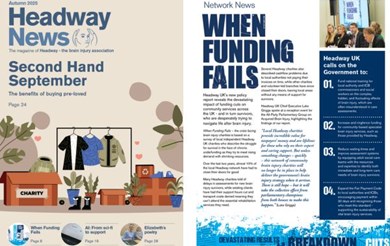Neuroplasticity in Action conference 2025
Transforming brain injury rehabilitation and law
- 10 October 2025
- The Pullman International Hotel, St Pancras, London
- Early-bird rate: £185 + VAT (book by 11 July)
- Standard rate: £235 + VAT
- 20% discount for NHS, statutory services and charities

You can download the conference flyer to find out more about this exciting event, including a full schedule and speaker biographies.

Sessions include
What Is Neuroplasticity? – Fundamentals and Principles
In this session Professor Leff will cover the concept of neuroplasticity from a behavioural, neural systems (brain imaging), and neural network (neuronal ensembles) perspective, including examples of such from studies of people with acquired (stroke, TBI) or degenerative (dementia) brain injury.
Professor Alexander Leff, Professor of Cognitive Neurology & Consultant Neurologist, Deputy Director: Head of Education & Student Experience, UCL Queen Square Institute of Neurology & National Hospital for Neurology & Neurosurgery, University College London
Neuroplasticity in Neurorehabilitation: How does advanced imaging help us make sense of clinical recovery?
This session explores cutting-edge methodologies for assessing neuroplasticity in individuals with traumatic brain injury (TBI). Participants will gain insights into the tools and techniques currently used to capture brain reorganisation and functional recovery. These include Functional Magnetic Resonance Imaging (fMRI), which tracks changes in brain activation during cognitive or motor tasks as well as at rest; Diffusion Tensor Imaging (DTI), used to map white matter pathways and observe changes in structural connectivity; and techniques such as Electroencephalography (EEG) and Magnetoencephalography (MEG), which monitor real-time neural activity through electrical and magnetic signals. Standardized functional assessments will also be discussed, focusing on how motor and cognitive outcomes can be interpreted through validated clinical tools and behavioural observations. Additionally, the session introduces emerging molecular biomarkers, such as Brain-Derived Neurotrophic Factor (BDNF), and their potential relevance to neuroplasticity research.
Designed for clinicians, researchers, and rehabilitation professionals, this session bridges neuroscience and clinical practice, offering a comprehensive look at how brain change can be meaningfully measured.
Dr. Steve Allder, Consultant Neurologist, Director of Neurological Services, Re:Cognition Healthcare
Non-Invasive Neurostimulation
Non-invasive neurostimulation is transforming how clinicians assess and support people with acquired brain injury. This session examines the mechanistic rationale for applying techniques such as transcranial magnetic stimulation (TMS), transcranial electrical stimulation (tDCS, tACS, tRNS), vagus nerve stimulation (tVNS), and functional electrical stimulation (FES/FET) in both the assessment and treatment of neurological function.
Attendees will explore the clinical utility of these techniques in motor, cognitive, and neuropsychiatric rehabilitation, alongside current evidence on their efficacy and feasibility. The session will also highlight strategies for integrating stimulation into personalised, evidence-based neurorehabilitation programmes tailored to individual neurological profiles.
It will address the emerging medico-legal landscape surrounding neuromodulation—focusing on how these interventions may influence evolving standards of care, equitable access to technology, and medico-legal decision-making in litigation contexts. This talk is ideal for clinicians, case managers, and legal professionals working in the brain injury and rehabilitation sectors.
Dr. Michael J. Grey, Reader in Rehabilitation Neuroscience, Loughborough University & National Rehabilitation Centre
Innovations in Neurorehabilitation
This talk aims to challenge the perception of ‘traditional’ neurological rehabilitation by considering the research evidence encompassing how our understanding of individualised neuroplasticity capabilities is shaping new developments and concepts that are accelerating clinical outcomes for patients.
Sarah Daniel, Director and Neurological Physiotherapist, MOTIONrehab Limited
The Neuropsychological Impact of Brain Injury
This session explores the neuropsychological consequences of brain injury through the lens of neuroplasticity. It will examine how cognitive, emotional, and behavioural changes arise from injury and how targeted interventions can support functional recovery.
Dr. Will Curvis, Clinical Neuropsychologist, Clinical Tutor, Lancaster University
What Does This Mean for the Legal Arena?
Focusing on the legal perspective, this session explores how advances in neuroplasticity and neurorehabilitation are reshaping compensation claims and legal proceedings for brain injury. It will examine recalibrated assessments of long-term disability, evolving evidentiary standards in medico-legal cases, and how emerging research supports or challenges existing legal arguments.
Adam Weitzman KC, Barrister, 7BR
Round Table Expert Discussion
This interactive discussion brings together diverse perspectives to:
- Review case studies that illustrate successful integration of neuroplasticity-based interventions.
- Explore the intersection of clinical practice and legal challenges in brain injury recovery.
- Discuss future directions and the complexities of incorporating emerging research into both patient care and litigation.










